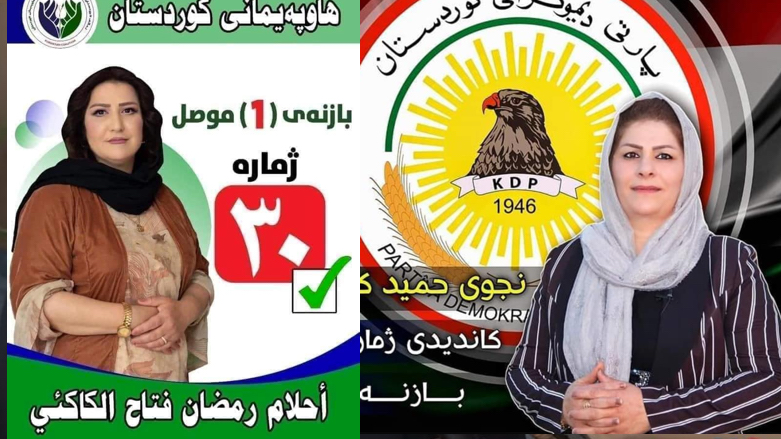For first time, two Kakayi women win two seats in Iraqi parliament
"They will take the problems and challenges the Kakayi face to the Iraqi parliament and will monitor the government in providing services, opportunities and jobs to the Kakayi youth.”

ERBIL (Kurdistan 24) – For the first time, two members of the Kurdish religious Kakai minority (also known as Kakayi in Kurdish) were elected as members of the Iraqi parliament during Sunday's Iraqi parliamentary elections.
Kurdistan Democratic Party (KDP) candidate Najwa Mam-Hmaedd Kakayi was elected in the second district of the Kirkuk Province. Also, Kurdistan Coalition candidate and Patriotic Union of Kurdistan (PUK) member Ahlam Ramazan was elected in the first district of the Nineveh Province.
"Now, two Kakayi women have won seats in the Iraqi parliament," Rajab Kakayi, a Kakai activist, told Kurdistan 24. He added that the two members will represent their respective parties, not just the Kakayi. However, he said there were two male Kakayi Iraqi MPs in the past.
"But they will take the problems and challenges the Kakayi face to the Iraqi parliament and will monitor the government in providing services, opportunities, and jobs to the Kakayi youth," he said.
Liza Falakadin Kakayi, a member of the Kurdistan Parliament from the KDP, pointed out that this is the first time since the fall of the Baath regime in 2003 that two female Kakaiyi members were elected in the Iraqi parliament.
"There were many times Kakayi candidates participated in the Iraqi elections but were not elected," Kakayi told Kurdistan 24.
Moreover, in the Kurdistan Regional Government (KRG) and parliament, there were Kakayi representatives before.
For instance, the father of Liza Kakayi, Falakaddin Kakayi, was an MP and later a minister of culture in the KRG. He died in 2013.
Furthermore, Saeed Kakayi was a member of the Iraqi Independent High Electoral Commission (IHEC) and former advisor to the Minister of Peshmerga. Also, Sirwan Muhammad Kakayi used to be a Kurdistan Parliament MP for the KDP in 1992.
Kakais follow Yarsanism, a religion followed by Kurds founded in the late 14th century in western Iran. Today, they live primarily in Iran, Iraq, and Turkey. Members reside in the Kurdistan Region and Iraq's disputed territories.
Having suffered religious persecution from multiple directions, historically and in recent years, community members have often sought to avoid attention by keeping their practices secret.
Many Kakai families evacuated their villages in Kirkuk's Daquq district following the militant group's rise to prominence in 2014. However, many joined Peshmerga forces to push back ISIS after 2014, including in a village symbolically named Kobani near Kirkuk.
Read More: Specter of ISIS in Iraq lingers for Kirkuk's Kakai minority
On Oct. 16, 2017, the Iraqi military and Iran-backed armed groups forced the Kurdish Peshmerga out of Kirkuk and other disputed territories. Since then, the security situation in those areas has deteriorated considerably, negatively affecting the Kakayi community in southern Kirkuk.
In the last few months, the US-led coalition has encouraged Iraqi and Kurdish security forces to form joint operation centers and joint brigades in the disputed territories to fill the security vacuum that has existed there since 2017.
In the summer of 2018, members of the Kakai community in Kirkuk called on the KRG, the Iraqi government, the UN, and civil society organizations to protect them from being targeted again by the Islamic State.
Mera Bakr, a researcher with the Konrad Adenauer Foundation, told Kurdistan 24 that "the Kakayi are predominantly located in the southern district of Kirkuk, Daquq. It is literally a hub for ISIS activities and its sleeper cells. They have evacuated, abandoned, several of their villages."
Read More: Two abducted Kurdish Kakai farmers found killed in Khanaqin
"However, the security threats that they have faced in recent years have not been addressed," he said. "So as a result, they have abandoned their villages, they have been attacked, many times, they've been killed, and they've been held hostage."
He added that the ISIS threat increased in southern Kirkuk during the COVID-19 pandemic when security forces were busy implementing measures to combat that pandemic.
He also said that the two new Iraqi Kakayi MPs were elected due to a new gender quota that allocates a number of seats for female candidates. Religious minorities such as Christians and Yezidis also have some seats reserved for their representatives. However, there is no special quota for the Kakayi.
"For instance, in Daquq district, attached to the second electoral district, the Kakayi votes were centralized there," Bakr said. "So, this was a reason that the KDP nominated a Kakayi candidate to get the Kakayi votes there, in a way to maximize the chances of this nominee to win."
Nevertheless, he said regardless of which party they belong to, ruling or opposition, it's a good development "because they can now deliver the voices of the Kakayi and defend their rights in the Council of Representatives."
Nadine Maenza, Commissioner at the Official US Commission on International Religious Freedom (USCIRF), also told Kurdistan 24 that is "encouraging to see an increase in the Kakai representation in the Iraqi parliament."
"This is especially surprising as they have no quota, like Christians or Yazidis (Ezidis). Having Kakais in a position to raise issues that impact their community benefits all in Iraq who support a pluralistic society."